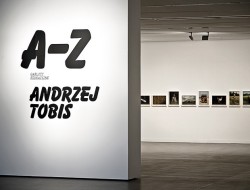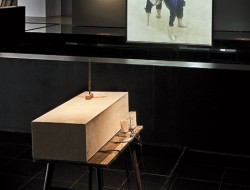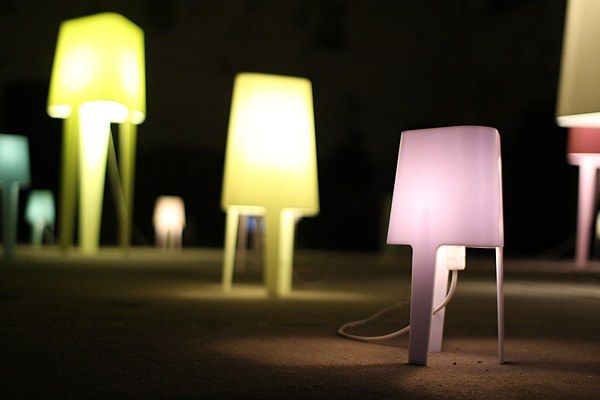An exhibition of Tomek Rygalik’s light objects in the Centre of Contemporary Art in Torun is yet another uncover of actions that show the world of contemporary design from the inside. This time CoCA is presenting an organic spatial installationGenotype.
The installation designed by Tomek Rygalik is a good example of strategy of balancing on the edge of art and applied pattern-designing. Multicoloured objects of simple forms according to the creator refer to an archetype of a classical lamp with a lampshade while operating in the space on the basis of a controlled affinity of colour, proportion, and scale. All the common components, which were selected with precision, unite a family of products in their effective diversity, thus the title of the installation, ‘Genotype’- the designer says. The objected shown in CoCA will emit light with variable intesity, pulse, emerge from the dark to immerse in it once again.
Light objects were made from the Corian® material, used mainly in the production of kitchen and bathroom coutertops. The designer, regarding the industrial character of the material in terms of artistic challenge managed to extricate its effective features, such as transparency, possibility of forming under the influence of temperature, and an invisible jointing.
The Genotype Installation has recently been presented in London on the Young Creative Poland exhibition, as an example of Polish creative design during the London Design Festival.
In a Studio&Kitchen on the day of opening at 8 PM Tomek Rygalik is going to tell the audience about the latest strategies of designing and about cooperation between a designer and industry.
Tomek Rygalik was born in Łódź in 1976. He studied architecture and urbanism at the Technical University in Łódź as well as industrial design at the Pratt Institute in NewYork. On leaving the institute, he worked for many design companies in New York. He was a consultant for such brands as Kodak, Polaroid, MTV, Uniliver or DuPont. In 2003 he took up post-graduate studies at the Royal College of Art in London where, upon graduating, he became a research associate. He runs his own design studio in London and in Łódź. He collaborates with Moroso, Artek, Iker, Noti, Heal’s, ABR. and Ideal Standard amongst others. He heads a design studio PG13 at the Academy of Fine Arts in Warsaw. For Tomek Rygalik’s projects, as well as for those designed by his students, resourcefulness is a trademark. He claims resourcefulness is an important trait of Polish design acquired in the days of neediness. His works were displayed at numerous exhibitions, including Berlin, London, Milan, Munich, New York, Tokyo and Valencia. He received several awards in design, including Rosenthal Design Award (2004), BSI Enviromental Design Award (2005), British Council Design Award (two projects – 2005). He was the winner, together with Dutch designer Jorre van Astem, of the British edition of Bombay Sapphire Martini Glass Competition 2005.
DuPont™ Corian®
DuPont™ Corian®, a registered product of the DuPont company (www.corian.pl, www.corian.com) is used in a wide range of applications in various segments of market, such as hotel industry, catering, health service, public places and in trade, as well as in house accessories, furniture making, lighting and in the production of decorative objects. It is a ‘solid surfaces’ type of material (composite) with the following features: non-porous, resistant to staining, easy to clean, sustainable, renewable and possible to repair. It is available in about 100 colours. DuPont™ Corian® solid surfaces may be used in theoritcally and practically every type of project.
 The Institution is funded from the budget of Toruń Municipality
The Institution is funded from the budget of Toruń Municipality


